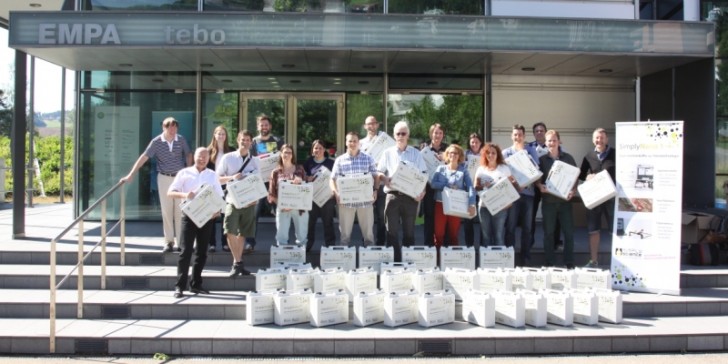Metrohm foundation sponsors 60 Nano-Experimental kits for ten schools in eastern Switzerland

(St.Gallen, June 24, 2015) The Metrohm foundation finances the production and distribution of 60 "SimplyNano1®" - Experimental kits, which were given to teachers of ten secondary schools of eastern Switzerland during a kick-off meeting on June 24, 2015. Over the next 2-3 years, these experimental kits should be intensively used by students and continuously evaluated.
"SimplyNano1®" class sets with new nano-workshop for group lessons
In 2012, the SimplyScience foundation and The Innovation Society jointly developed the "SimplyNano1®" - Experimental kit. It is the first educational material on practical aspects of nanotechnology for secondary schools. The kit contains 8 experiments from the world of nanotechnology as well as a complete documentation in five languages (German, English, French, Russian, Spanish). The kits are given to teachers for free in the course of coaching events. Since 2012, more than 1000 kits have been produced and over 50 workshops were held. Both the kits and the courses are funded by sponsors.
So far, one kit was handed out to every teacher who participated in a workshop. However, many teachers wished to possess a whole class set of kits. Thanks to the generous support of the Metrohm foundation, a pilot project could be realised, in which class sets of 6 kits each were given to ten schools of eastern Switzerland. The use of a whole class set enables the students to work in small groups of each 3-4 pupils and explore the experiments in an autonomous way. This way of learning is highly emphasised in the new Swiss curriculum (Lehrplan 21).
Kick-off workshop at EMPA St.Gallen
On June 24, 2015, 15 teachers of secondary schools from the Eastern Switzerland region were invited to the "SimplyNano1®" - Metrohm - project at EMPA St.Gallen. In an introductory presentation following the warm welcome by Christoph Meili (The Innovation Society), basic terms of nanotechnology were explained and the content of the kit was demonstrated. In the following, the aim and requirements of the project were clarified. It was emphasised that the kits as well as the additional educational material are expected to be intensively used during the coming 2-3 years and that the kit should be evaluated by both teachers and students. This will allow The Innovation Society to gain detailed information about the integration of the material in curricula and enable the improvement and further development of the kit. Further, the educational material and the kits should help to integrate the topic of nanotechnology into the curriculum and increase the enthusiasm for Science and Technology subjects.
Integration of the experiments into a nano-learning-parcours
In addition to the previous experimental material, a nano-parcours consisting of eight stations was developed, in which the experiments of the kit are be embedded. This nano-parcours extends the previous experiments and documentation and provides a complete file with tasks for every station for the students and solutions as well as further information for teachers. Based on the previous topics of nanodimension, nano-surfaces, and reactivity of nanoparticles, the workshop includes the topic “nano-applications”. This issue is especially relevant in the context of the guiding idea "Education for Sustainable Development" (Bildung Nachhaltige Entwicklung, BNE) within the curriculum 21. The form of a parcours enables the students to improve generic competences such as independence or cooperation skills in addition to the disciplinary competences of mathematics or nature and techniques. Based on the curriculum 21, these are the central competences that should be addressed.
After the presentation of this relation to the curriculum 21 and the introduction to the nano-workshop, the new stations developed in the context of the "SimplyNano1®" - Metrohm - project were presented and demonstrated. These include the Tyndall-effect as well as applications in the field of bionics. As an introduction to the topic of nanotechnologies in everyday life, the interactive web application "Nanorama Loft" (http://www.swissnanocube.ch/nanorama/?L=3) of the Swiss Nano-Cube platform was presented. Additionally, complementary educational material available on the Swiss Nano-Cube platform was introduced.
During the following practical part of the afternoon, the participants explored the experiments of three stations contained in the nano-workshop. At one station different aspects of the Lotus-effect® were showed, such as demonstrating changing surface-properties depending on the surface material on a variety of plants (Roses, Broccoli, Hornbeam, Lotus, etc.). In contrast, the super-hydrophobic effect could also be tested on technical surfaces. At the third station - the reactivity of materials in dependence on their surface-to-volume-ratio (for example of salt in water), a lively discussion about possible connections of this phenomenon to the daily life arouse. After an hour, the tasks of the stations as well as questions about the educational material, the kit or the project were discussed.
At the end of the afternoon the 60 "SimplyNano1®" - Experimental kits as well as an electronic version of the complete teaching material were given for free to the participants. Thanks to this project, up to 1'200 students will explore the phenomena from the nano-world in an autonomous way.
Short portraits
The Metrohm Foundation is the owner of the globally operating company Metrohm AG headquartered in Herisau (Switzerland). In addition to cultural and social engagements within the region of Appenzell and surroundings, the Metrohm-Foundation supports natural sciences as well as motivated and talented students (http://www.natwibegabte.ch/).
The SimplyScience Foundation aims to increase the understanding of scientific-technical questions of students and inform them about career opportunities. The "SimplyNano1®" - Experimental kit contains 8 experiments about nanotechnologies. The kit, which was developed in cooperation with The Innovation Society, St.Gallen, is given for free to teachers of secondary school during three-hour coaching events. (http://www.simplyscience.ch/).
Source: The Innovation Society
Image Source: The Innovation Society